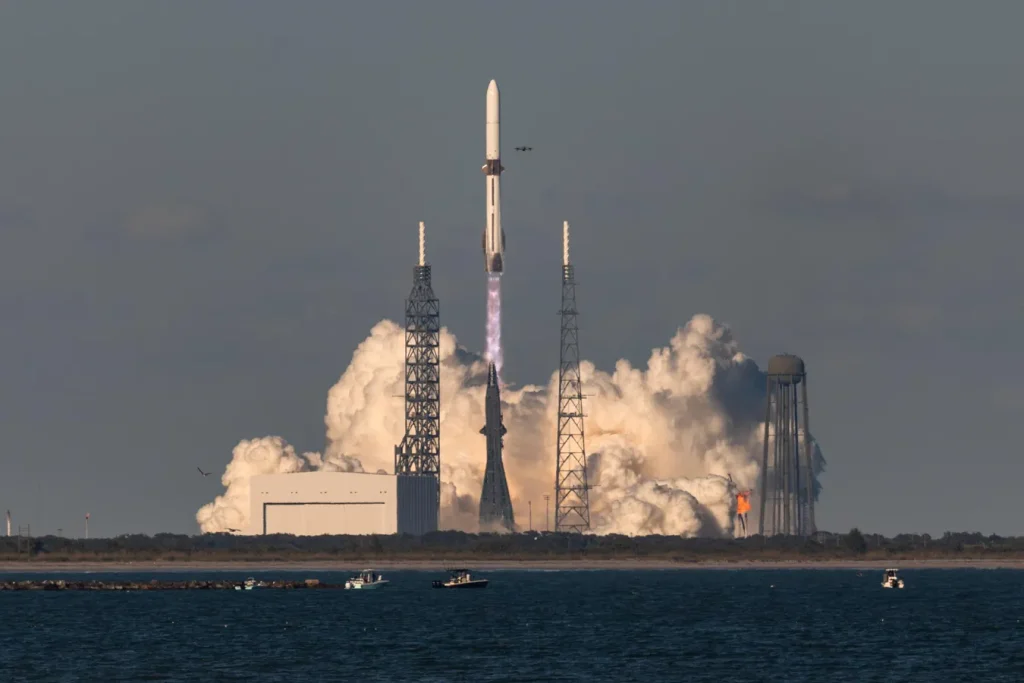The Prototype: Blue Origin’s Mars Mission, AI Language Learning, and More
In this week’s edition of The Prototype, we explore groundbreaking developments in space exploration, artificial intelligence, and scientific research that are shaping our future. From Blue Origin’s successful Mars mission to revolutionary approaches in language learning, these stories showcase humanity’s relentless pursuit of innovation.
Blue Origin has achieved a remarkable milestone in space exploration with the second successful launch of its New Glenn rocket. On Thursday, Jeff Bezos’ space company not only sent the powerful rocket skyward but also successfully landed its booster back on Earth for reuse—a crucial capability for sustainable space travel. The New Glenn, capable of carrying twice the payload of SpaceX’s Falcon 9, transported two NASA spacecraft called Escapade, developed by L.A.-based Rocket Lab. These spacecraft will study how solar radiation affects Mars’ magnetic environment, potentially explaining why the red planet lost its atmosphere over time. What makes this mission particularly noteworthy is its unusual timing—typically, Mars missions launch every 26 months when the planets are optimally aligned, resulting in a nine-month journey. However, this mission tests a novel trajectory using Earth’s gravity as a slingshot, which could revolutionize our approach to Mars exploration by allowing trips virtually anytime rather than during limited launch windows.
Meanwhile, on Earth, AI is transforming how we learn languages. Connor Zwick’s journey to creating Speak began in Seoul, where he witnessed firsthand the intense demand for English language education. Traditional methods, often academic and fear-inducing, left students hesitant to practice speaking—the most crucial aspect of language acquisition. Zwick saw an opportunity to create an AI tutor that offers a judgment-free environment where learners can make mistakes without embarrassment. Today, Speak has reached impressive milestones with 15 million downloads and over $100 million in annualized revenue. The app, valued at $1 billion, uses OpenAI’s models to create interactive role-playing scenarios for six languages: English, Korean, Spanish, Japanese, French, and Italian. Users can practice real-world conversations, from ordering at restaurants to making small talk, with an AI coach that provides immediate feedback and encouragement, addressing a fundamental challenge in traditional language education.
Scientific breakthroughs continue to push the boundaries of what’s possible in technology and medicine. Researchers at Finland’s Aalto University have successfully performed tensor operations—the mathematics underlying modern AI—using light waves instead of traditional electronics. This development could lead to optical chips that process AI functions at speeds approaching the speed of light, dramatically outpacing conventional silicon chips. In the medical field, scientists have made progress understanding why the human body rejects gene-edited pig organs, developing methods that could make xenotransplantation more viable for patients in need. Additionally, biotech startup Gate Bioscience has secured $65 million to develop “molecular gates” targeting diseases like Alzheimer’s and diabetes by trapping harmful proteins in cells. These advances demonstrate how fundamental research can address some of humanity’s most pressing challenges.
Quantum computing is advancing through strategic partnerships between industry and academia. IonQ plans to deploy a dedicated quantum computer and network at the University of Chicago, funding research to develop new quantum technologies. This collaboration highlights how university research ecosystems can accelerate technological development in emerging fields. However, scientific collaboration faces potential constraints as some research advocates express concern over proposed legislation that would ban federal funding for collaborations with Chinese scientists. This tension between national security concerns and the traditionally open nature of scientific exchange reflects broader geopolitical challenges in maintaining scientific progress. Meanwhile, newly released documents reveal extensive correspondence between Jeffrey Epstein and prominent scientists like Lawrence Krauss and Noam Chomsky, raising questions about the influence of controversial figures in scientific communities.
Beyond technological innovation, research continues to reveal surprising connections between our behaviors and health outcomes. A fascinating study from Finland suggests that civic participation—specifically voting—may contribute to longevity. The research found that non-voters had a dramatically higher risk of death compared to voters: 73% higher for men and 63% for women. While the study couldn’t establish direct causation, researchers suggest that voting may encourage broader community involvement and social connections, which are known to positively impact health. This finding adds a compelling public health dimension to the importance of electoral participation, suggesting that civic engagement might be as important for personal wellbeing as it is for democracy.
For those seeking intellectual entertainment, Hal Johnson’s book “Impossible Histories” offers a refreshing take on alternate history. Rather than focusing on predictable scenarios like “What if the South won the Civil War?”, Johnson explores more creative historical inflection points, such as “What if Freud had been obsessed with a different Sophocles play about killing your dad and marrying your mom?” The author’s engaging writing style makes complex historical counterfactuals accessible and entertaining, demonstrating that even our understanding of the past remains open to imaginative reinterpretation. Like the scientific and technological innovations covered throughout this edition, Johnson’s work reminds us that human creativity knows no bounds—whether applied to space exploration, artificial intelligence, or reimagining history itself.


